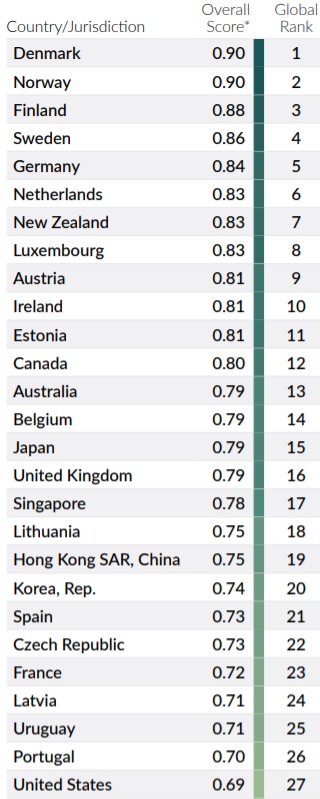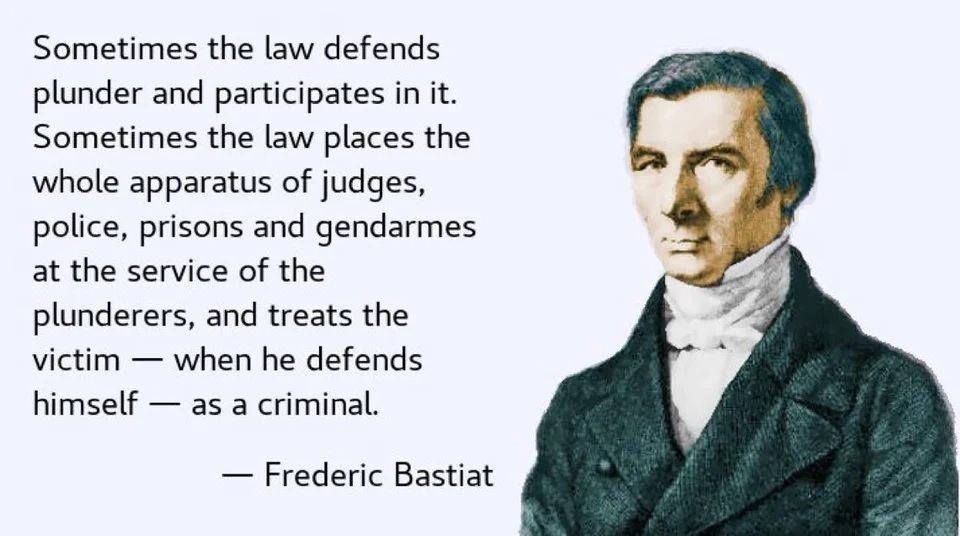Back in 2014, I shared a video explaining why the “rule of law” is important for a just and free society.
Here’s another video on the same point.
When I discuss rule of law (generally when explaining the various components that are used to calculate rankings of economic freedom), I often use a shortcut definition – namely that rule of law exists when government officials don’t have arbitrary power.
 In other words, rule of law is present when even politicians and bureaucrats have to adhere to laws and rules.
In other words, rule of law is present when even politicians and bureaucrats have to adhere to laws and rules.
Where is the rule of law strongest?
According to the World Justice Project, Scandinavian nations are at the top, led by Denmark.
Other European nations – and European offshoot nations – dominate the rankings (there is a benefit to Western Civilization).
A handful of East Asian jurisdictions also get good scores.
And you’ll notice I had to include 27 nations in order to see where the United States ranks.
That’s depressing, especially considering that the U.S. ranked #19 when I first wrote about this report back in 2014.
But at least we’re not Venezuela (gee, what a surprise), which is in last place of the 139 nations included in the rankings.
Readers also should note that the dismal rankings of some other major nations, most notably China (#98) and Russia (#101).
Now let’s consider the economic implications.
In a new working paper from the University of Rome, Esther Acquah, Lorenzo Carbonari, Alessio Farcomeni, and Giovanni Trovato estimate the impact of rule of law on economic outcomes.
We estimate the impact that our measures of institutional quality have on the level and the growth rate of per capita GDP, using a large sample of countries over the period 1980-2015.
…Institutions matter especially in low and middle-income countries, and not all institutions are alike for economic development. For this group of countries, we find: i) a positive correlation between our main institutional index and the GDP growth and ii) that improvement in the reliability and fairness of the legal system leads to a higher long-run per capita GDP level. We also document non-linearities in the causal effects that different institutions have on growth, and the presence of threshold effects.
For what it’s worth, I sometimes state in my speeches that rule of law is akin to the foundation of a building.
It needs to be solid in order for the rest of the building (fiscal policy, trade policy, regulatory policy, and monetary policy) to be livable.
One final point is that you don’t necessarily get more rule of law by enacting additional laws. Indeed, that may actually reduce the rule of law because politicians and bureaucrats then can engage in capricious enforcement.
As pointed out back in the 1800s by the great Frederic Bastiat.
Simply stated, over-criminalization is not a good thing.
P.S. In the are of economic development, there’s a big discussion over whether there needs to be more “state capacity” if we want more growth.
I’ve criticized some advocates because they use “state capacity” as an excuse to push for bigger government.
But it is true that very weak and incompetent governments do a poor job of providing rule of law, so it’s also true that there are instances where it would be good to boost state capacity. Assuming the term is properly defined.

[…] wants a stronger European Union because that region – to its credit – is strong on the rule of law and Western Civilization is a good […]
[…] they were talking about equality of opportunity, or equality before the law, that would be […]
[…] the provision of core “public goods” such as the rule of law is correlated with better economic […]
[…] of the reasons the western world became relatively rich in recent centuries is that “rule of law” evolved to constrain capricious and dictatorial behavior by government […]
[…] The rule of law (good idea) […]
[…] The rule of law (good idea) […]
[…] generally have bad fiscal policy, but they tend to score highly in other areas (i.e., good rule of law, low levels of red tape, […]
[…] nations generally have bad fiscal policy, but they tend to score highly in other areas (i.e., good rule of law, low levels of red tape, […]
[…] country is especially bad on trade policy and the rule of law (legal system and property […]
[…] I’m in favor of Haiti having a stronger and better democracy. That hopefully would lead to improvements in the “rule of law.” […]
[…] I’m in favor of Haiti having a stronger and better democracy. That hopefully would lead to improvements in the “rule of law.” […]
[…] Developing nations do a bad job of providing rule of law, but I have near-zero faith that more government spending will lead to improvements. Instead, more […]
[…] P.S. Rule of law (rather than arbitrary rule by kings, chiefs, emperors, and dictators) is a necessary prerequisite for growth. And weak rule of law is an even bigger challenge in the developing world than bad advice from international bureaucracies. […]
[…] Rule of law (rather than arbitrary rule by kings, chiefs, emperors, and dictators) is a necessary prerequisite […]
[…] Below is an article by Dan Mitchell entitled, ”Which Nations Do Best at Providing Rule of Law…and Why It Matters,” notes: […]
[…] the “rule of law” being overlooked and “due process” getting trampled in the rush to go after the assets of […]
[…] the “rule of law” being overlooked and “due process” getting trampled in the rush to go after the assets of […]
[…] the “rule of law” being overlooked and “due process” getting trampled in the rush to go after the […]
[…] dès qu’il n’y a pas de pouvoir arbitraire, estime l’expert fiscal Dan Mitchell sur son blog «International Liberty». « En France, l’Etat de droit se porte mal. Le débat sur l’«irresponsabilité […]
[…] Which Nations Do Best at Providing Rule of Law…and Why It Matters […]
It makes perfect sense that 27 nations had to be added to find The Kleptocracy’s ranking. Under the Nixon Anti-Libertarian law, the Libertarian Party 2016 vote total was larger than 29 of the world’s smallest countries, yet the Looter Kleptocracy manages to euchre us off the ballot time after time.
The volume of law should be weighed. A lot of law nibbles away freedoms like a duck Also the size of public budgets need to be considered. Federal, state, and local budgetary totals reflect the amount of freedom ceded to “public service(?)”
An interesting measure would also be the percent of the workforce in government. Therin lies the raw materials of collusion between industries, and the government.
The only problem I have with this list is it fails to recognize that many of these nations at the top of the list have made up the “rule of law” as they are going along- especially with this COVID crap. They adopted so called “emergency measures” for something that is no more an emergency than driving a car. Do you consider emergency measures part of the law? If so, then perhaps your list still applies. But for the most part- other than a few states- the US is ahead of most of these on their vaccine mandate and lockdown practices. Sweden was right up there for a while, until they hit their citizens with the mandates.